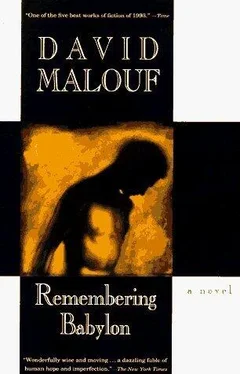His father, Rob, had been their mother’s favourite among her brothers. When she saw him last he had been a lad of nineteen just newly married. She had made the shirt he was married in out of pure sea-island cotton that cost her two shillings a yard; she had saved a whole six months for it.
They knew all the details of their mother’s life at home, she had told it to them a hundred times, but now she told it all again: how her own mother, their grandmother, as a child not much older than they were, had worked down the mine — imagine that now! The house with a little backyard not big enough for a cat to jump in — and here they were with twenty acres. The father and four brothers, all miners. Janet saw them, in her mother’s telling, sat down at tea together, still in their pit dirt, black-fisted, noisy, only their eyelids, when they fell to eating, and their teeth when they grinned, showing white in the sooty masks, till one after the other, in the dark little scullery off the yard, they ducked their heads in a tub, soaped their backs and shoulders, and too big now in their whiteness for the low-ceilinged parlour, came towelling their heads and larking about and laughing, and were restored at last — she saw that too — to their separate, recognisable selves: Willie, Ewan, Jamie, Rob.
Her mother as a girl had kept house for them all, washed their shirts, darned their socks, listened to their growls and grumbles, but she hated the pit life and was determined that when she found a man of her own he would never be a miner. She had watched them grow up, each one, from eager, affectionate little lads into coarse fellows who pushed down and extinguished everything that was fine in them. On Saturday nights they were no better than any other of the Airdrie men. They got into fights, came home bruised but elated, then lay stupefied.
When their daddie turned up — Janet, glancing up, saw him grin, very pleased with himself and looking twenty years younger — it was just in time, she told them. She was already twenty-four and on the way to being an old maid. One of her brothers brought him in after a football game, but she had seen him already in a tug of war team the summer before. A big, raw-boned, fair-skinned, sandy fellow. Silly drunk and a bit ashamed of himself, he was still as a stockfish on that first occasion, though he was bold enough later. He worked as a gardener, like his father, on a big estate. Her brothers warned her, teasingly, that he wasn’t as tame as he looked, that he liked a dram, had an eye for the girls; but she had seen that for herself. She wasn’t put off.
Janet listened to all this in a kind of dream, as she always did when her mother spoke of things that brought the world back there alive in her; she clung to every detail, she couldn’t get enough of it. She was in love with this other life her parents had lived; with Scotland and a time before they came to Australia, before she was born, that was her time too, extending her life back beyond the few years she could actually recall, and giving reality to a world she had need of; more alive and interesting, more crowded with things , with people too, than the one she was in. This cousin who was coming would bring some of that with him. He would still have its light upon him, alive and actual. He would have its speech in his mouth.
But when he arrived he showed no gratitude for the chance they were offering him, and wasn’t at all pleased to see them. He was a stocky, tough lad of nine, a town boy. Airdrie, he told them loftily, was a toon . The bush — it wasn’t even country — was of no interest to him, and Janet saw, because he set out in his superior know-all way to make her see it, that the things they had been saving to show him, all their little treasures and secrets, were in his eyes poor — she had not seen till now just how poor. She felt humiliated, as if the poverty was in them. It did not occur to her that he might be protecting himself; that his refusal to enter into their world might be a fear of losing, more than he had done already, the one he had left and was heartsick for. He scoffed and swaggered. Nothing here was good enough for him.
He began every sentence with ‘At hame in Scotland’ — yet at home, as she knew from her mother, they had been starving. She would harden her heart and mock him. ‘Oh, at hame in Scotland,’ she would sing, imitating his accent, which she also loved. He went red in the face and could barely hide his tears.
She had her triumph. But seeing it she felt ashamed, it was so easy. And Scotland, home, was sacred to her. She was going against herself when she mocked it.
There were times when she felt helpless against a place which, as her parents evoked it in every word they uttered, belonged so much more strongly to all the highest emotions in her than the place she was in. And he had seen it, and she had not. He would have that over her for ever.
After a time he discovered what he was endowed with that gave him an advantage over her and used it mercilessly; except that the thing was so native, so accidental in him, that though he could name it, even he did not know what it really was. He was full of scorn when she failed to understand some word he used, and took delight, with their mother, in slipping into the old tongue. He would look towards her with his eyes wide and innocent but a little smile of satisfaction on his mouth that for the moment he had shut her out. Her fist ached to wipe the smug look from his face, and he knew it, and was more cocky than ever. ‘I don’t understand,’ little Meg would whine. ‘What’s splairgin’? What’s a moothfu’ o’ mools?’ But she would not ask.
The struggle between them was fierce. Till Lachlan came she had been used to going her own way, unconditioned and free. She had no limit to herself. Now she resented his easy assumption that he was superior, should take the lead in all their doings, and that she must naturally yield to him.
She was half a head taller, for the moment she had that over him; but it would not last, she had no illusions about that. (She had long ago discovered the satisfaction of tormenting herself with hard truths.) She sought out ways to hurt him. He was very proud and liked to believe he was tough, but he cried easily, she could make him cry. Then, when she did, she was shocked, felt miserable, and longed, against her own interest, to comfort him, though she saw that if she did he would hate her for it.
Sometimes for a day or two they would be close. Full of liveliness and schemes for fresh adventure, he was easy so long as you gave in to him. He had always to assert himself and be first. He was in love with his own nobility but at the same time needed to boast, and of things, Janet saw, that were not always true. It offended her own sense of inviolable honesty. She was hard on herself; why should she be less hard with him? She was consumed after a time with the need to expose him, to make him confess that so much of what he claimed was just another attempt to intimidate and assert himself and the superiority of ‘hame’; which might be true — the latter in fact was true — but she could not let him be the judge of it.
She would have forgiven him all if he had shown any sign of humbling himself. She was full of affection, she wanted to love him, and longed for some softening in him that would allow it without loss of pride. But first he had to admit need, and he would not. Everything she and Meg knew, and he did not, was not worth the knowing.
They showed him the reddish-gold resin that ironbarks wept, which when you chewed it had a bitter flavour. He spat it out and thought they were making a fool of him.
They showed him bacon-and-eggs bushes. He told them scornfully, ‘That’s no’ them. That’s no’ the real wans.’ He had seen bluebells. When he stood up and sang of them in his high clear voice, Janet was overwhelmed and their mother wept. He glowed. He was radiant. The light of some far-off place she had only imagined shone through his skin.
Читать дальше












